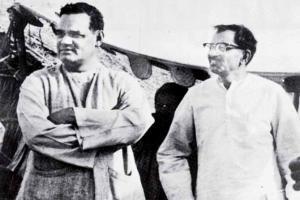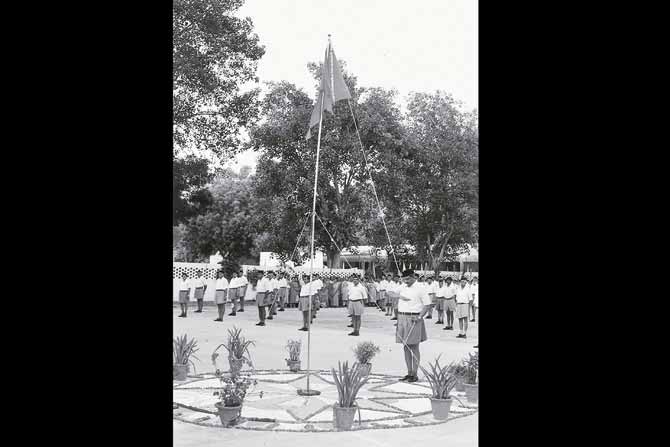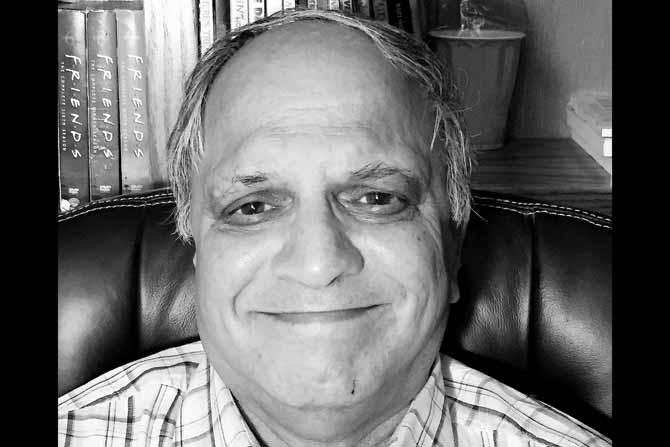Walter K Andersen, co-author of a new book, which sheds light on the Sangh Parivar, explains how the Hindu organisation is reaching out to its Muslim brethren and why the Bharatiya Janta Party is spineless without it

Atal Bejari Vajpayee and Deen Dayal Upadhyaya, RSS thinker and co-founder of the political party Bharatiya Jana Sangh. Pics Courtesy/The Rashtriya Swayamsevak Sangh, from the Panchjanya and Organiser archives
Only a few can count themselves as fortunate as Walter K Andersen who first came to India in the 60s on an exchange programme from the University of Chicago, to study university politics. The circumstances were such that he ended up meeting a lot of people from the Rashtriya Swayamsevak Sangh (RSS), and "inevitably became aware of and interested in" the organisation's workings. It's somewhere around this time that he got direct access to the Sangh, headquartered in Nagpur. For a parivar, which has to date worn the "members-only" tag with pride, and granted the privilege of admission to outsiders very grudgingly, Andersen recalls being rather lucky.

Dhwajvataran, or lowering of the flat, at the end of a shakha, a local daily meeting of members of the Sangh
ADVERTISEMENT
"My advisors at the University, Lloyd and Susanne Rudolph, told me, 'if you have access make use of it'. They encouraged me to pursue this topic [as a research subject]," he says. Several years later, much after his research, he got acquainted with scholar Shridhar D Damle. "He was a democratic socialist even then and was drawn by the anti-establishment views of the RSS. Damle was (and is) an Indian nationalist and India's poor showing in the China war led him to believe that the country needed a nationalist government willing to defend India's interest," says Andersen.

Walter K Andersen
In Damle, Andersen found a great partner to further his understanding of the Sangh, which even then was a work in progress. Their book, The Brotherhood in Saffron in 1987, was the first step in this direction. Over 30 years on, Andersen and Damle have reunited for a new book, RSS: A View To The Inside (Penguin Random House), which offers a fresh look into how the Hindu volunteering organisation, first founded by Keshav Baliram Hedgewar in 1925, has progressed to becoming one of the world's largest non-government associations — it has "an estimated 1.5–2 million regular participants in its nearly 57,000 local daily meetings (referred to as shakhas), 14,000 weekly shakhas and 7,000 monthly shakhas, taking place across 36,293 locations nationwide as of 2016" — that is also very much involved in the "policy process" of the country. That it took only three decades for a shift in the narrative, in itself is commendable, and worth fresh investigation, says Andersen, who along with his wife, has spent several days at the Sangh's headquarters.
Today, Andersen, a professor of South Asia studies, School of Advanced International Studies (SAIS), Johns Hopkins University, and Damle, a freelance journalist in the US, have become foremost scholars of the right-wing outfit. But, Andersen, is quick to correct the definition for the Sangh. "The use of the Western term 'right' reflects a kind of orientalism and is therefore, misleading. On economic issues, RSS is to the left of centre and on cultural, to the right of centre. On Muslims, there is an effort to bring Muslims into what the RSS considers the national mainstream. Its leaders often point to the cultural Hindu activities of the Muslim majority Indonesia as a model of what should exist in India," he says.

Shridhar D Damle
The book also explains how. Contrary to the popular notion of the RSS being anti-Muslim and doggedly pushing the Hindutva ideology with the BJP, Andersen and Damle talk of how the Sangh, which is undoubtedly one of the most crucial "power centres" of the Narendra Modi government today, has also experimented with bringing Muslims into their fold. The Muslim Rashtriya Manch (MRM), which describes itself as an organisation, established with the support of the RSS, to bridge the gap between the Hindus and Muslims, is one such effort, the authors state in the book. And, while the RSS has never included it in its official list of affiliates, the authors don't discount the possibilities of the same in the near future. But, if that were to happen, wouldn't it be detrimental to the Sangh's interest? "A lot depends on how the Manch interacts with the Muslim community and what shape it takes. So far, RSS pracharak Indresh Kumar, is shaping the MRM in a way that the Sangh does not particularly consider harmful to its interest," says Andersen.
Having said that, Andersen reiterates that there is a need for the Sangh to be more inclusive. "To be frank, the RSS, in our view, needs to better accommodate the cultural contributions of the Muslim experience in India," says Andersen. "There is a need to take a more critical view of government policies. Muslims are currently at the bottom of the socio-economic ladder. One has to think about what can be done to improve their economic and educational status," says Andersen, adding that the MRM can play a role here, and thus, become more relevant.
But, progress is happening albeit slowly. Despite facing brickbats on a host of controversial moves, right from Ram Mandir to cow slaughter and Ghar Wapsi, the RSS, the authors say, has become "more outward looking". "Over the last two decades, there has been a proliferation and growth of RSS' affiliates. All the affiliates operate in areas where you have necessity of government contact," says Andersen. For instance, he explains that one affiliate of the RSS addresses issues such as support prices and import costs, like transportation involved in agriculture. "This compels the RSS to take interest in such issues too," he says, adding that in doing so, the Sangh is now playing a more active role in India's policy. And, all said and done, the Sangh family will always be the primary source from where the BJP will draw its strength. "The Sangh itself will try to stay out of politics, but the BJP will continue to use RSS members to campaign and use its network to identify issues and potentially popular candidates. This is partly because of the weak party structure of the BJP," says Andersen.
Catch up on all the latest Mumbai news, crime news, current affairs, and also a complete guide on Mumbai from food to things to do and events across the city here. Also download the new mid-day Android and iOS apps to get latest updates
 Subscribe today by clicking the link and stay updated with the latest news!" Click here!
Subscribe today by clicking the link and stay updated with the latest news!" Click here!







